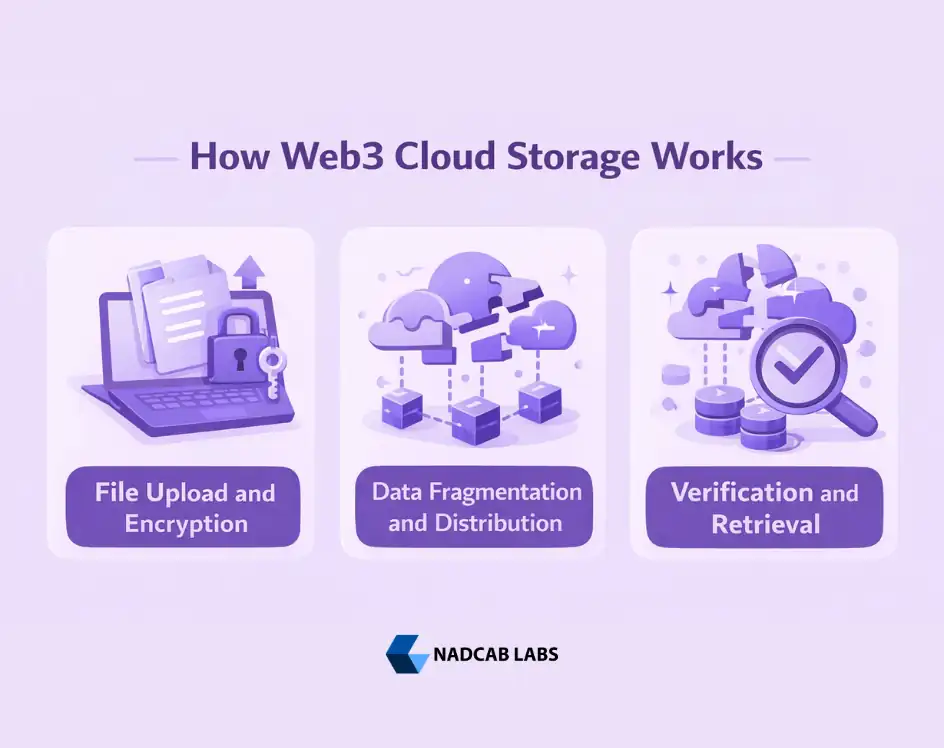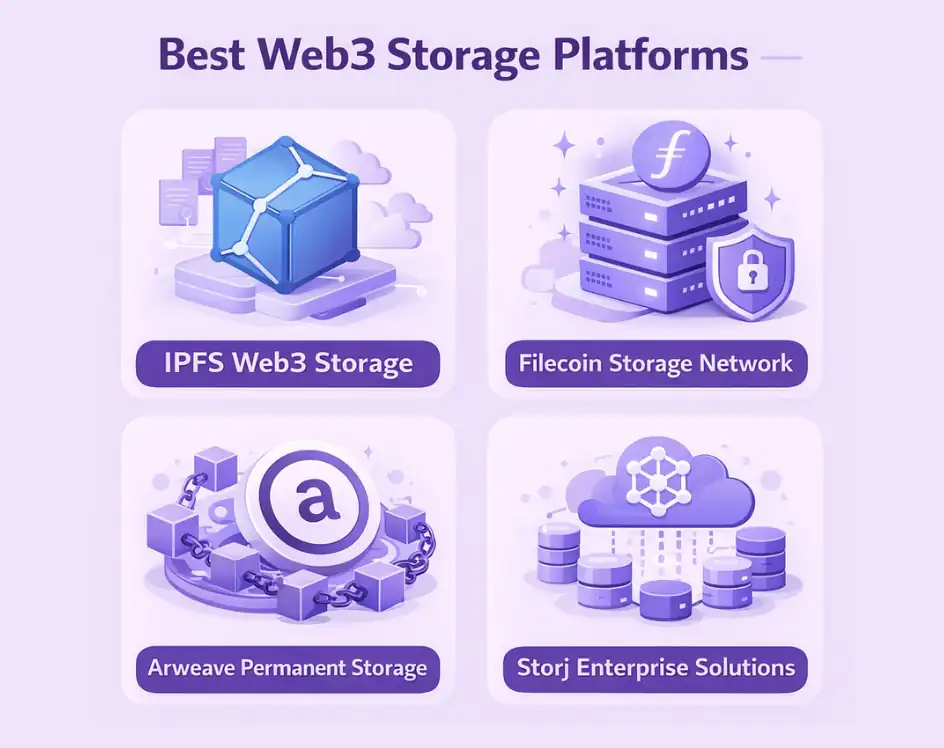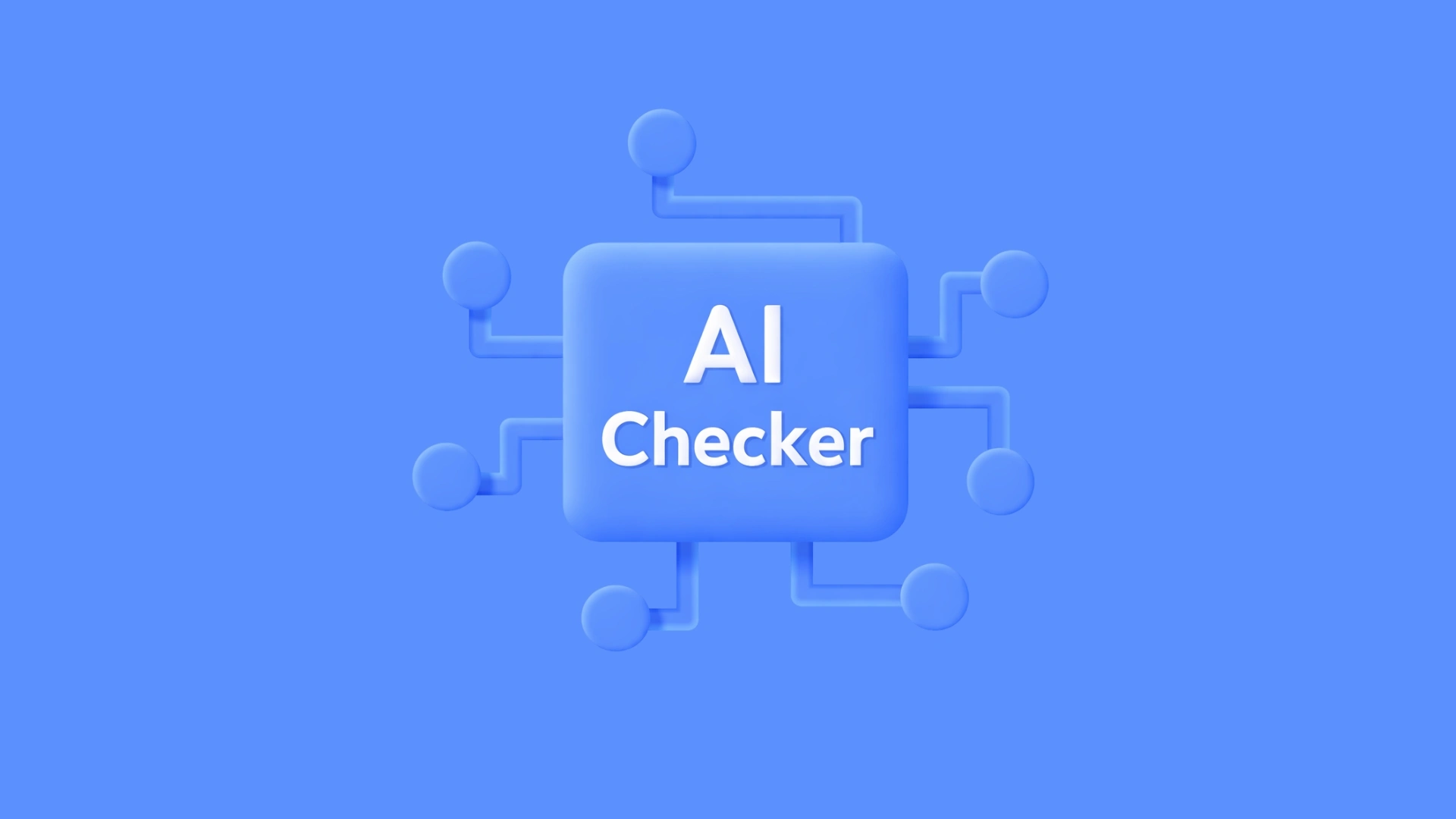Decentralized storage is transforming how data is stored, accessed, and protected across the internet. Instead of relying on centralized servers controlled by a few large corporations, Web3 storage distributes data across networks of independent nodes, creating systems that are more resilient, secure, and user-controlled. The global decentralized storage market reached $622.9 million recently and is projected to surge to $4.5 billion by 2034, reflecting a CAGR of 22.4% as enterprises increasingly seek alternatives to traditional cloud providers.[1] This comprehensive guide explores what decentralized storage is, how it works, its benefits, leading platforms, and why it matters for the future of the internet.
Key Takeaways
- Distributed Architecture: Web3 storage spreads data across multiple nodes instead of centralized servers, eliminating single points of failure.
- Enhanced Security: Data is encrypted and fragmented before distribution, making unauthorized access extremely difficult.
- User Control: Users maintain ownership of their data rather than surrendering control to centralized providers.
- Censorship Resistance: No single entity can remove or alter content stored on decentralized networks.
- Cost Efficiency: Decentralized cloud storage often offers competitive pricing by utilizing unused storage capacity globally.
- Data Permanence: Platforms like Arweave offer permanent storage ensuring data remains accessible indefinitely.
- Blockchain Integration: Smart contracts enable automated storage payments and access management.
What Is Decentralized Storage?
Decentralized storage is a method of storing data across a distributed network of computers rather than on centralized servers owned by a single organization. This approach fundamentally changes how digital information is managed by removing dependence on traditional cloud providers like Amazon Web Services, Google Cloud, or Microsoft Azure. In decentralized file storage systems, data is encrypted, broken into fragments, and distributed across numerous independent nodes worldwide.
The development of decentralized storage aligns with core Web3 principles of user sovereignty, transparency, and trustless systems. Rather than trusting a corporation to protect and maintain access to your data, blockchain-based storage uses cryptographic proofs and economic incentives to ensure data remains secure and available. This represents a fundamental shift in how the internet handles information, moving from centralized control toward distributed ownership.
Understanding how decentralized storage works requires familiarity with content addressing, a key concept that differentiates it from traditional storage. Instead of locating files by their server address, decentralized systems use content identifiers based on the cryptographic hash of the data itself. This means identical files have identical identifiers regardless of where they are stored, enabling efficient retrieval from any node holding that content.
How Web3 Cloud Storage Works
Web3 cloud storage operates through a series of coordinated steps that ensure data security, availability, and integrity. Understanding this process helps businesses and developers make informed decisions about implementing blockchain storage solutions.

File Upload and Encryption
When users upload files to a Web3 data storage system, the data is first encrypted using strong cryptographic algorithms. This encryption occurs before the file leaves the user’s device, ensuring that only authorized parties with the decryption keys can access the content. The development of end-to-end encryption in decentralized systems provides security guarantees that centralized providers cannot match.
Data Fragmentation and Distribution
After encryption, files are broken into smaller fragments and distributed across multiple storage nodes in the network. Each fragment is stored on different nodes, meaning no single node holds a complete copy of any file. This distribution creates redundancy, ensuring data remains accessible even if some nodes go offline. Web3 storage solutions typically maintain multiple copies of each fragment across geographically dispersed locations.
Verification and Retrieval
Storage providers must periodically prove they still hold the data they were paid to store. Protocols like Filecoin use cryptographic proofs to verify data possession without requiring providers to transmit the actual data. When users want to retrieve their files, the system locates all fragments, reassembles them, and decrypts the content. This process happens seamlessly, providing an experience similar to traditional cloud storage while maintaining decentralized infrastructure.
Web3 Storage vs Traditional Cloud Storage
Comparing decentralized storage vs centralized storage reveals significant differences in architecture, security, and user control. Understanding these distinctions helps organizations evaluate which approach best suits their needs.
| Feature | Traditional Cloud Storage | Web3 Storage |
|---|---|---|
| Control | Provider controls data access and policies | Users retain full ownership and control |
| Security | Vulnerable to centralized breaches | Encrypted and distributed across nodes |
| Availability | Service outages can block access | Data remains accessible across nodes |
| Censorship | Provider can remove files | Resistant to censorship |
| Cost Model | Subscription-based pricing | Pay-per-use, often more affordable |
| Scalability | Limited by provider infrastructure | Scales with network growth |
Benefits of Decentralized Storage
Decentralized storage offers numerous advantages that make it increasingly attractive for businesses, developers, and individuals seeking alternatives to centralized solutions. These benefits extend beyond simple file storage to encompass broader implications for data sovereignty and internet architecture.
Enhanced Security and Privacy
Secure data storage on blockchain networks provides multiple layers of protection. Data encryption before upload ensures privacy, while distribution across nodes means attackers would need to compromise multiple independent systems simultaneously. This architecture significantly reduces vulnerability to the large-scale breaches that have affected major centralized providers. Web 3.0 Development Services increasingly incorporate these security features as standard practice.
Resilience and Availability
By eliminating single points of failure, decentralized backup solutions ensure data remains accessible even during network disruptions. If some storage nodes go offline, data can still be retrieved from other nodes holding copies. This resilience is particularly valuable for mission-critical applications where downtime is unacceptable. Recent outages at major cloud providers have highlighted the risks of centralized infrastructure, driving interest in distributed alternatives.[2]
Cost Efficiency
Decentralized cloud storage can offer significant cost savings by utilizing unused storage capacity from participants worldwide. Rather than building expensive data centers, networks like Filecoin and Storj enable anyone with spare storage to contribute and earn rewards. This distributed model reduces infrastructure costs while maintaining or improving reliability compared to traditional providers.
Data Sovereignty
Users maintain complete control over their data in decentralized systems. Unlike centralized providers who may access, analyze, or monetize stored information, blockchain storage ensures that only authorized users can decrypt and access files. This sovereignty aligns with growing regulatory requirements around data protection and privacy. For businesses exploring this space, partnering with experienced Web3 platform providers ensures proper implementation.
Best Web3 Storage Platforms
Several decentralized storage platforms have emerged as leaders in the Web3 ecosystem, each offering unique features and capabilities. Understanding these platforms helps organizations choose solutions that best match their requirements.

IPFS Web3 Storage
The InterPlanetary File System (IPFS) is a peer-to-peer protocol for decentralized file storage that forms the foundation for many Web3 applications. IPFS uses content addressing to identify files by their cryptographic hash rather than their location. This approach enables efficient content distribution and ensures data integrity. The protocol has become essential infrastructure for dApps, NFT platforms, and decentralized websites, with Web3 Application Development teams frequently building on IPFS.
Filecoin Storage Network
Filecoin builds on IPFS by adding an incentive layer that rewards storage providers with FIL tokens. This creates a decentralized marketplace where users pay for storage and providers compete to offer the best service. The Filecoin network recently launched Onchain Cloud, enabling verifiable storage, fast retrieval, and programmable payments for Web3 applications.[3] Protocol Labs, the team behind Filecoin, has built over 16 exabytes of storage capacity, making it the largest decentralized storage network.
Arweave Permanent Storage
Arweave specializes in permanent data storage, ensuring information remains accessible indefinitely. Unlike other platforms where storage must be renewed periodically, Arweave uses a sustainable endowment model where a one-time payment funds perpetual storage. This makes it ideal for archival data, legal documents, and NFT metadata storage where permanence is essential. The platform gained momentum with its AO compute layer, enabling on-chain processing alongside permanent storage for AI and research applications.
Storj Enterprise Solutions
Storj offers enterprise-grade decentralized storage with S3-compatible interfaces, allowing organizations to migrate from traditional cloud providers without changing existing systems. The platform reported sevenfold increases in annual recurring revenue, demonstrating growing enterprise adoption. Storj bridges traditional cloud infrastructure and decentralized storage, appealing to organizations seeking both performance and decentralization.
Web3 Storage Use Cases
Decentralized storage supports diverse applications across industries, from consumer applications to enterprise infrastructure. Understanding these use cases helps organizations identify opportunities to leverage Web3 storage in their operations.
Web3 Storage for dApps
Decentralized applications require storage solutions that match their decentralized architecture. Traditional cloud storage creates centralization risks that undermine dApp reliability. Web3 storage for dApps ensures application data remains accessible without depending on centralized providers. Development teams building on platforms like Ethereum increasingly integrate IPFS or Filecoin for user data, configuration files, and application assets.
Web3 Storage for NFTs
NFT metadata storage represents a critical use case for decentralized file storage. While NFT ownership is recorded on blockchain, the associated media files and metadata typically require separate storage. Storing this content on centralized servers creates vulnerability; if the server goes down, NFTs lose their associated content. Decentralized storage ensures NFT metadata remains permanently accessible, preserving the value and integrity of digital collectibles. Understanding Web3 market growth trends helps stakeholders appreciate the expanding demand for these solutions.
Enterprise Data Backup
Companies can leverage decentralized backup solutions for secure, tamper-proof data archival. Critical business data stored across distributed networks gains protection against ransomware, system failures, and natural disasters. The enterprise segment already captures significant market share in decentralized storage, with large organizations recognizing the value of distributed backup infrastructure.
Media and Content Distribution
Large media files like videos, audio, and high-resolution images benefit from decentralized distribution networks. Content delivery through distributed nodes can improve performance by serving files from locations closer to users. This approach reduces bandwidth costs while maintaining high availability and censorship resistance for content creators and distributors.
Ready to Implement Web3 Storage Solutions?
Professional teams provide comprehensive Web3 Development Solutions to help design and deploy decentralized storage infrastructure for your applications.
Challenges and Considerations
While decentralized storage offers significant advantages, organizations should understand potential challenges when evaluating these solutions for their needs.
Performance Considerations
Retrieving data from distributed nodes can sometimes be slower than accessing centralized servers, particularly for hot data requiring immediate access. However, ongoing development continues improving retrieval speeds through caching, content delivery networks, and protocol optimizations. Hybrid approaches that combine decentralized storage with edge caching address many performance concerns.
Technical Complexity
Implementing decentralized storage can be more complex than using traditional cloud providers. Development teams need familiarity with new protocols, token economics, and decentralized architectures. However, tools and SDKs are rapidly improving accessibility. Services like web3.storage abstract much of this complexity, providing familiar interfaces while leveraging decentralized infrastructure underneath.
Adoption and Integration
Not all applications support decentralized storage natively, requiring integration work to connect existing systems. Enterprise adoption also requires addressing compliance, governance, and support requirements that differ from traditional cloud relationships. Web 3.0 Development Services help organizations navigate these challenges through experienced guidance and custom development.
Future of Decentralized Storage
The future of Web3 storage looks promising as technology matures and adoption accelerates. Several trends are shaping how decentralized storage will evolve in coming years.
AI integration represents a major development direction, with storage networks building capabilities to support AI training data, model checkpoints, and inference workloads. Filecoin’s collaboration with AI-focused partners positions decentralized storage as infrastructure for the growing AI economy. The development of verifiable storage proofs ensures AI systems can trust the integrity of their training data.
Cross-chain interoperability will enable seamless storage access across different blockchain ecosystems. Smart contract integration allows automated storage payments and access management, enabling new application architectures. As the Web3 ecosystem matures, decentralized storage will become increasingly integrated with other infrastructure components including compute, identity, and networking. Web3 crypto wallet integration will streamline user experiences by enabling seamless storage payments and access management.
The Web3 market is expected to reach approximately $41.45 billion by 2030, with decentralized storage forming a critical infrastructure layer supporting this growth. As data generation continues accelerating globally, the demand for scalable, secure, and user-controlled storage solutions will only increase.
Conclusion
Decentralized storage represents a fundamental shift in how the internet handles data, moving from centralized control toward distributed, user-owned infrastructure. By spreading data across networks of independent nodes, Web3 storage solutions provide enhanced security, resilience, and user control that traditional cloud providers cannot match.
From NFT metadata preservation to enterprise backup solutions, decentralized storage supports diverse applications across industries. Platforms like IPFS, Filecoin, Arweave, and Storj offer mature solutions for organizations ready to embrace decentralized infrastructure. As the technology continues evolving with AI integration, cross-chain interoperability, and improved performance, adoption will accelerate across both consumer and enterprise segments.
For organizations exploring Web3 storage implementation, partnering with experienced Web3 Application Development teams ensures proper architecture design, security implementation, and integration with existing systems. Professional Web3 Development Solutions expertise helps navigate the technical complexities while maximizing the benefits of decentralized storage for your specific use cases. As the internet continues evolving toward decentralization, early adoption of these storage solutions positions organizations to benefit from the emerging Web3 ecosystem while maintaining control over their most valuable asset: their data.
Frequently Asked Questions
Web3 storage is a decentralized file storage system that uses blockchain technology and peer-to-peer networks to store data across distributed nodes rather than centralized servers, ensuring security, privacy, and user control.
Data is encrypted before upload, then fragmented and distributed across multiple independent nodes. This ensures no single node holds complete files, and only users with decryption keys can access the content.
Often yes, as decentralized networks utilize unused storage capacity globally. However, costs vary by platform and use case. For archival data, platforms like Arweave offer competitive one-time payments for permanent storage.
IPFS (InterPlanetary File System) is a peer-to-peer protocol that forms the foundation for many Web3 storage solutions. It uses content addressing to identify files by their cryptographic hash rather than location.
Yes, platforms like Storj offer enterprise-grade solutions with S3-compatible interfaces, allowing organizations to adopt decentralized storage without changing existing systems. Many enterprises already use these solutions for backup and archival.
NFT metadata storage refers to storing the media files, descriptions, and attributes associated with NFTs on decentralized networks to ensure they remain permanently accessible regardless of any single platform’s availability.
Arweave uses a sustainable endowment model where one-time payments fund perpetual storage through investment returns. This design ensures data remains accessible indefinitely without requiring ongoing payments.
Leading decentralized storage platforms include IPFS for content-addressed storage, Filecoin for incentivized storage markets, Arweave for permanent storage, and Storj for enterprise-grade solutions. Each offers unique features for different use cases.
Reviewed & Edited By

Aman Vaths
Founder of Nadcab Labs
Aman Vaths is the Founder & CTO of Nadcab Labs, a global digital engineering company delivering enterprise-grade solutions across AI, Web3, Blockchain, Big Data, Cloud, Cybersecurity, and Modern Application Development. With deep technical leadership and product innovation experience, Aman has positioned Nadcab Labs as one of the most advanced engineering companies driving the next era of intelligent, secure, and scalable software systems. Under his leadership, Nadcab Labs has built 2,000+ global projects across sectors including fintech, banking, healthcare, real estate, logistics, gaming, manufacturing, and next-generation DePIN networks. Aman’s strength lies in architecting high-performance systems, end-to-end platform engineering, and designing enterprise solutions that operate at global scale.






